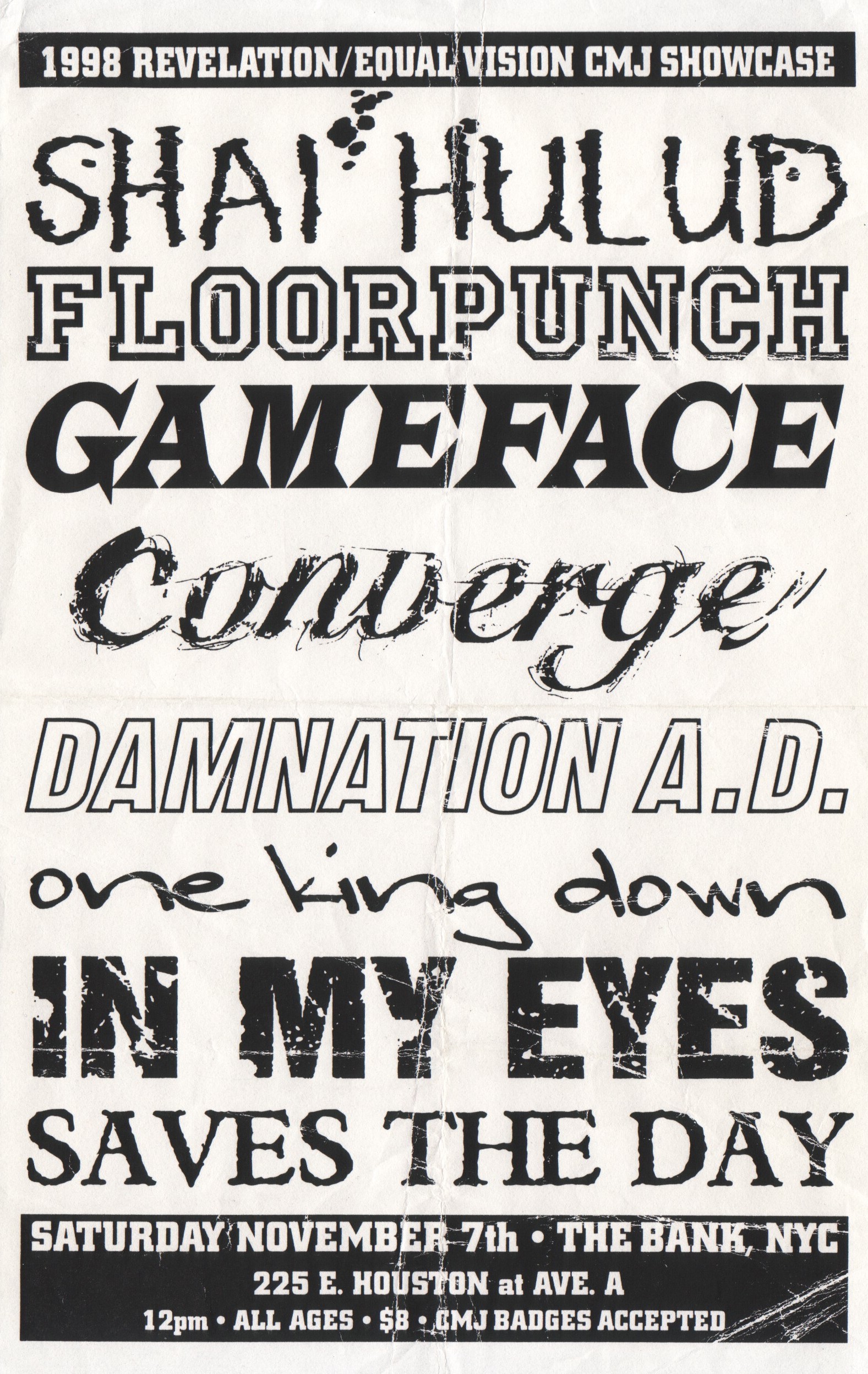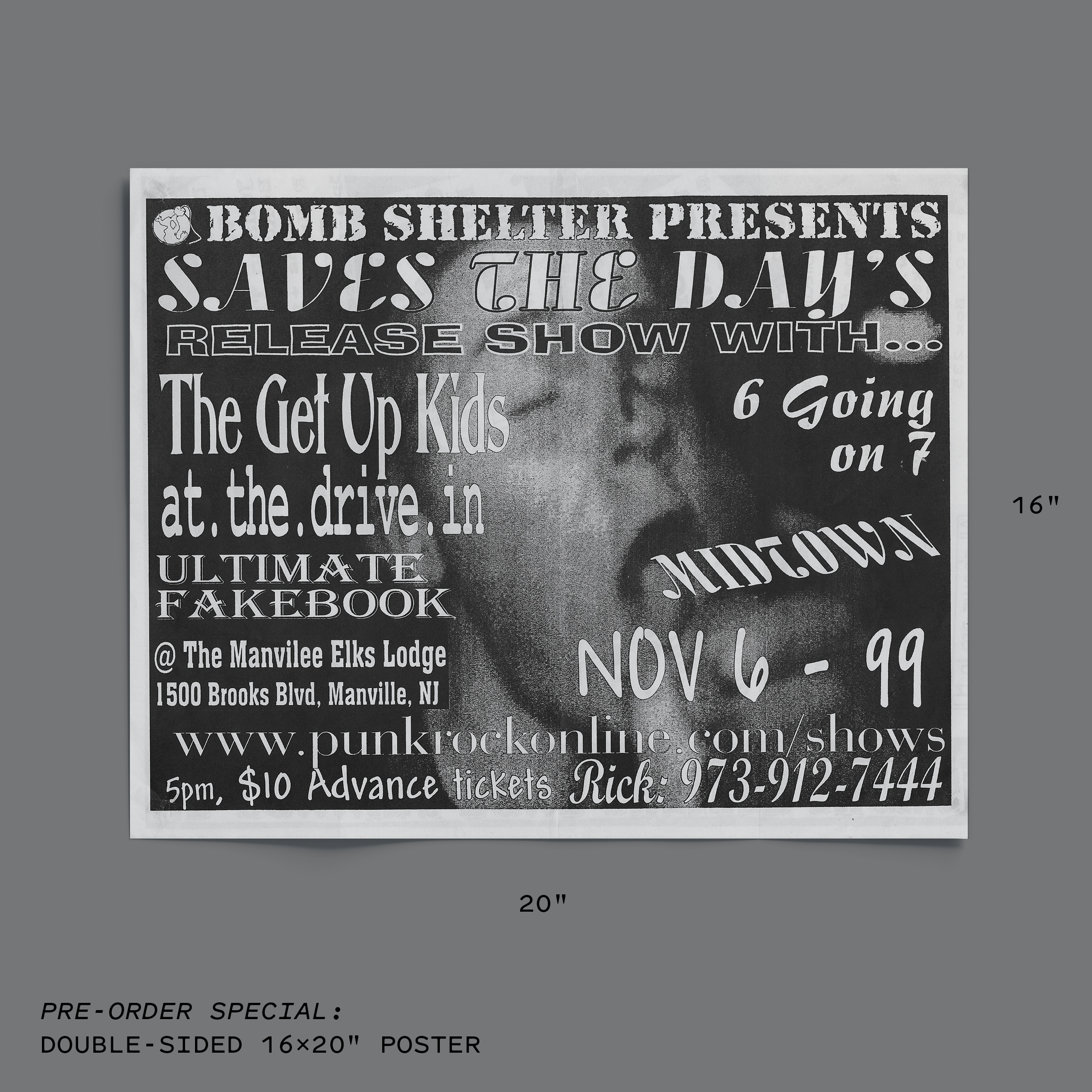Three years ago, Tom Mullen — founder of the Washed Up Emo blog and podcast of the same name — released a book. It was called Anthology Of Emo Volume 1, and featured chapters on The Promise Ring, Dashboard Confessional, Texas Is The Reason, The Get Up Kids, American Football, Mineral, Knapsack, and Rainer Maria, bands from a time and place that Mullen calls “the pre-Bleed American, and also pre-internet era — that moment where you go to a show and you don’t know what [the band] looks like.”
For the second installment of Anthology Of Emo, Mullen looks to cross the line into the 2000’s with chapters on bands like Jimmy Eat World, Braid, Foxing, Saves The Day, and more. Pre-orders of the book began shipping as of last week, but we’re happy to share an exclusive excerpt from a 2013 interview with Saves The Day’s Chris Conley, which finds Conley recalling the formation of his band, and the music that inspired him in the first place. Check it out below.
~
Conley: I think Led Zeppelin was the band that really sparked my own inner need to play music, because… in the classical stuff, I’m playing other people’s music. I think I wanted to make my own. [Led Zeppelin] were using a lot of those classical chords and modes that my brain, my subconscious, was just familiar with. It wasn’t like I was listening to other classic rock bands, like Lynyrd Skynyrd or something. That stuff I just don’t like. It just doesn’t do anything for me. The two classic rock bands that really really blew my mind when I was a kid [were] Led Zeppelin and Aerosmith, actually. The ’70s records of Aerosmith are phenomenal, and what I notice from them now is all that classical music in those records.
I mean, Steven Tyler grew up underneath his dad’s piano listening to these incredible compositions. So, that pulled me into rock. Once I was into rock music, then I started listening to other bands with loud guitars. And I really didn’t like anything. There was very little that grabbed me, but I remember feeling at this point in my life, like “Why isn’t there more cool guitar music?” And I felt like it must have been six months later, Nirvana came on the scene, and Nirvana… changed everything. That was the moment where I became more interested in this music that was under the radar, because Nirvana came out and no one else sounded like it.
So, of course, I’m trying to find more stuff that sounds like it, but the stuff that I can find is at my local record store where somebody is saying, “hey, check out Shudder to Think,” or “hey, check out Archers of Loaf or Jawbox.” So I started getting into indie rock, or the really heavy indie music, through Nirvana. Then, I got into that show 120 Minutes, which was just a miracle that existed at that time. I was up one night before school. I was up late watching these videos, and the video for “Seven” by Sunny Day Real Estate came on, and—oh my gosh, I have goosebumps right now. That was a game changer… I lived across the street from this mall where they had a Sam Goody. And I walked over there and bought Diary.
And that was the beginning of a big musical journey into the heart of indie music. You know, Nirvana, and that kind of stuff, was the mainstream—oh, and Smashing Pumpkins, you know, Stone Temple Pilots. All that stuff was so so good. But Sunny Day was my link to the underground, the real current under the surface. It’s through Sunny Day, I started finding other friends that liked that kind of music. And then they’d say, “hey, have you heard this band Jawbreaker?” you know, or “have you heard of the Swirlies?” You know, stuff like that. And I just kind of went on the journey.
I just follow my ears, really. I just get really excited and just follow them, never thinking, “Oh…This is a cool record. This is what people like.” I just like my own stuff. So, that was how I got, eventually, into punk rock, was through Sunny Day—then into Jawbreaker. And then, once I found Jawbreaker, it was over.

Mullen: It totally makes sense. Even hearing your records… it’s like you can hear the Sunny Day. You can hear the indie, but you can hear the heaviness…
Conley: Yeah, Jawbox, too.
Mullen: You listening to all those bands, that makes total sense.
Conley: I still feel, in my songs today, I still feel Jeremy Enigk, and I feel Blake Schwarzenbach all over it. It’s nice to still feel connected to that music that was so inspiring when I was younger. I mean, I literally wore out Diary. The CD was just completely scratched, and I carried the booklet around with me at school, you know? Like, I would read the lyrics. In 10th grade, we had to do a book report of poetry, and I chose the lyrics from 24 Hour Revenge Therapy. And it worked! My teacher was like, “This is really great stuff. Good report, Chris.”
Mullen: [Laughs] I love that. Well, it’s interesting. I mean, did you get involved with the scene in New Jersey? Or were you more sort of playing records and listening to bands kind of on your own, watching TV? Or… Did you start getting involved in the local scene as well?
Conley: It’s funny. I feel like I’m pretty oblivious. I’m sort of in my own world, and I don’t notice a lot of stuff that’s going on outside. So, it’s a miracle that I got anywhere. Honestly, I should still be in a basement somewhere listening to records. But how this all happened was that one of my friends from school, who also liked that sort of underground music, was Bryan Newman, who was the original drummer for Saves The Day. Well, Bryan was pretty ambitious, and he really liked hardcore music.
So, in 7th grade—this was before I even played guitar, I was still in orchestra—Bryan joined a hardcore band in Trenton, New Jersey called Nation In Transit. He would come back the next day after practice and have all these stories about how they are playing all these songs and rehearsing these songs to make a tape. It was so cool to hear about that, but I didn’t play guitar yet. So, the next year, I had started playing guitar, and Bryan said, “Hey why don’t you come over and play with me?” I went over there. We had a blast. We put a blank tape in a cassette player and just recorded the entire jam, and it sounded like Rage Against The Machine.

It was all riffs and half time and stuff. It was just so much fun. And it was just like my best friends were there waiting for me. And that’s how it all started. Then I would write songs, because I’ve always really loved just kind of messing around and finding little cool chord changes or putting little ideas together, you know –on a piano or something. I just love doing that. And so Bryan, and a few other people, just sort of gravitated around that and noticed that I was writing these kind of cool songs. And they said, “We should get a singer and a bass player, and we should go play shows. These are cool. We should make a tape. We should go and record something.”
I never ever in a million years would have thought to even ask someone to be in a band. It wouldn’t have happened. So this is all Bryan Newman. And then once Bryan got us interested, we booked time at a studio, and we made a tape. This is in ninth grade. We made a tape, and it was just so much fun. And ever since then, I just continued to write songs, looking forward to eventually recording them as a group of songs… We started playing in people’s backyards or their basements. Somebody would have a party, and we’d say, “Hey, can we play?” So we started playing all over. You know, just friends from school or some other school in town. Then, the years went by.
We made a 7-inch in our sophomore year of school, and then by junior year, we had gone through a few changes, gone through a few band names, and we were about to record another demo tape. We just felt like it was time to have a name-change, and our buddy came to the studio when we were going to record a bunch of songs. He was just going to hang out for the day. This is Sean McGrath, who, at the time, was in a band called Hands Tied. And we got to know Sean through going to see Mouthpiece at the Princeton Arts Council when we were kids. He came along. He was listening to us play, and he thought, “Hey, this is actually pretty cool. Seriously, you guys could play these hardcore shows that are going on in New Brunswick. I mean, it’s good stuff… I think a cool name for your group would be Saves The Day.”
We were sitting in the studio, Trax East, South River, New Jersey. This is April 17, 1997. We went in and spent one day making the demo. That day, we went home, and we decided that we liked the name Saves the Day. Sean told us it came from his favorite Farside song, which was called “Hero” — the SoCal punk band Farside. I guess there’s a lyric that says, “I wanna be the one who saves the day,” and it stuck. We loved the name. We made the tape. We started playing these hardcore shows. The first show we ever played as Saves The Day — this is hilarious. We played Rutgers University opening for MC Lyte.
Mullen: Yes!
Conley: Because Sean had a friend that was putting on the day’s music. As we played in this indoor facility with bounce houses. It was like a fair, basically… Sean was really cool. He had all these friends, you know, that put on shows. So, later that day…he’s like “Hey, my friends in Ignite are playing this show near New Brunswick. We should go down and just see if we can hop on their equipment and play a few of these songs.” I was like, “Alright!” I didn’t know anything, you know.
So we go down there, and it is a packed show. I mean, Ignite was just so so awesome and put on incredible shows. People were all about it at the time. And they’re the nicest dudes ever. Like, just the nicest dudes ever. So, sure enough, they let us get on their equipment before they even played. And we played like five songs from our demo. The guitars are horribly out of tune. Everyone’s, like, looking at us strangely. And that was the first day of Saves The Day’s live performing history.
Anthology Of Emo Vol. 2 is out now. Order it here.







